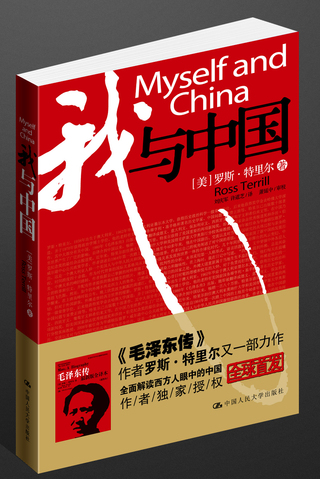WHAT'S UP? - Activities
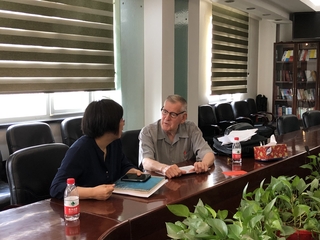
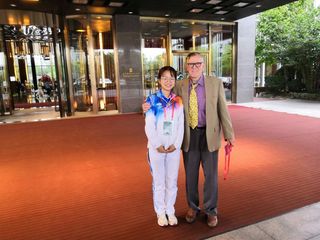
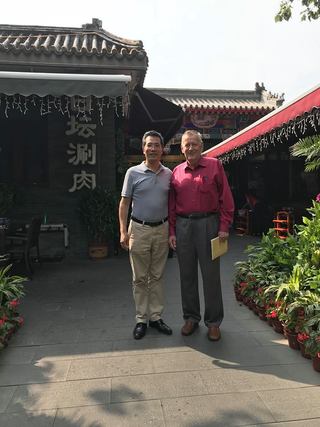
I was in Beijing, May, 2018 for talks and discussions. At my publishers, Renmin daxue chubanshe (China People’s University Press), the sessions were complex, as editors grappled with new rules from the government.
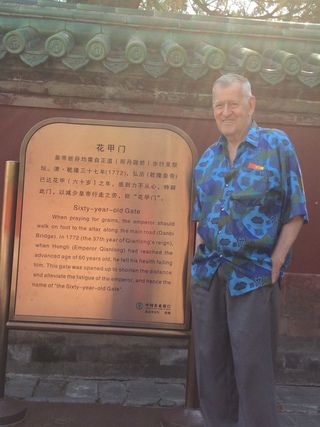
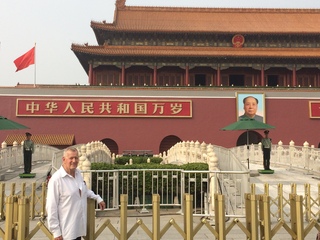
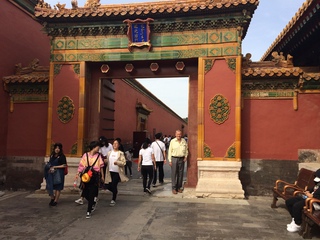
In Australia in April, 2016 I was in Sydney at the Australian Broadcasting Commission, to be interviewed by Tom Switzer, and in Melbourne for my 60th anniversary class at Wesley College. You feel close to some of these “boys” of 1956 because the shared experience in those same buildings, going to the Olympic Games and having Queen Elizabeth visit, was intense at a formative period.
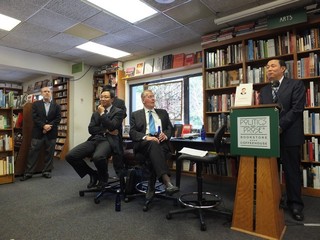
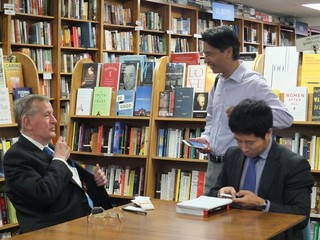
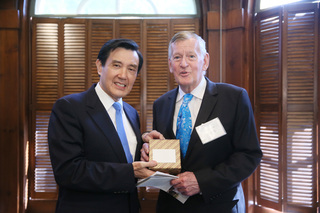
I attended a conference in Beijing,
“WORLD CONFERENCE ON SINOLOGY"
My talk was on: “CHINESE VALUES AND AMERICAN VALUES UNDER GLOBALIZATION
- Changes in Political Culture and Prospects for a Harmonious World”
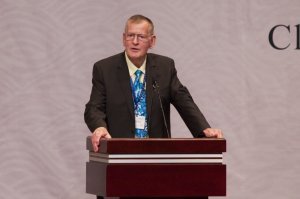
In September I spoke at the World Conference on Sinology 2014 at
China Renmin Peoples University
My lecture topic was: A TEMPTATION FOR THE WEST: TREATING CHINA AS SYMBOL
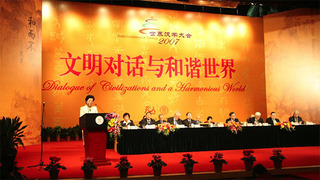
July, 2014:
Ross was in China speaking at the Third Nishan Forum on World Civilizations at Shandong University in Jinan, 5/20-5/24. His lecture was on: “THE TENSION BETWEEN CONFUCIANISM AND LEGALISM IN CHINESE HISTORY: ARE THERE ECHOES IN THE PRC YEARS?”
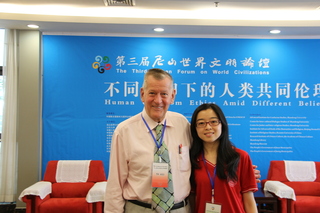
LETTER ABOUT PRESIDENT KENNEDY AND JOHN FAIRBANK ON CHINA
IN NEW YORK REVIEW OF BOOKS:
March 20, 2014
Issue
JFK vs. JKF
Ross Terrill
In response to:
Who Was JFK? from the February 20, 2014 issue
To the Editors:
Frank Rich is correct to sum up JFK as contradictory and elusive as well as inspiring [NYR, February 20]. While Kennedy projected a hopeful idealism, he remained deeply conservative on China, bearing out part of Ira Stoll's case.
As the Truman-Acheson White Paper of 1949 on the "loss of China¨ unleashed a furious postmortem, JFK, then in the House of Representatives, wrote a letter out of the blue to Professor John [King] Fairbank of Harvard, later my teacher. "I feel that the policies of yourself and others in the State Department contributed much more heavily than the White Paper would indicate to the downfall of our position in China. Therefore in view of the sorry record I cannot put any degree of faith in your plans for the future." President Kennedy would later dismiss Fairbank as a Communist sympathizer, which was hardly true.
The Harvard professor wrote back in an unfortunately flippant tone to the future president: "I think you will be amused to realize that while you have been blaming me for our disaster in China, I on the other hand have been blaming you and Mr. [Walter] Judd."
There indeed was a conservative strand in JFK's complex thinking about the world documented by Seymour Hersh in "The Dark Side of Camelot,"especially on Cuba, China, and anything to do with communism.
Ross Terrill
Fairbank Center
Harvard University
Cambridge, Massachusetts
In Beijing in November 2013, signing yet one more printing of “Mao” at the offices of publisher Renmin daxue chubanshe (China People’s University Press)
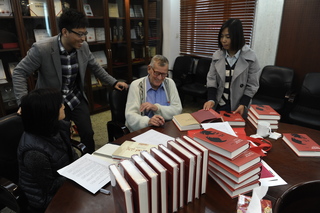
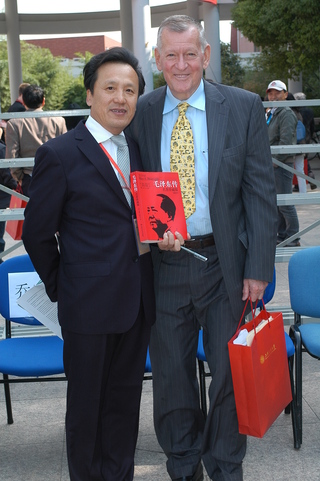
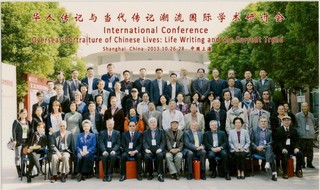
Ross was in Shanghai October 26-28, 2013 to give
a keynote speech at Jiao Tong University’s Center for Life Writing (and the Biography Society of China’s) international conference on “Overseas Portraiture of Modern Chinese Lives: Life Writing and Its Current Trends”
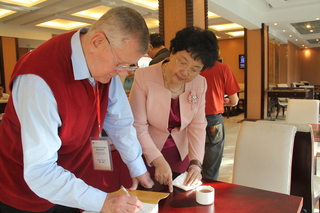
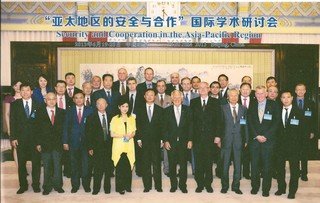
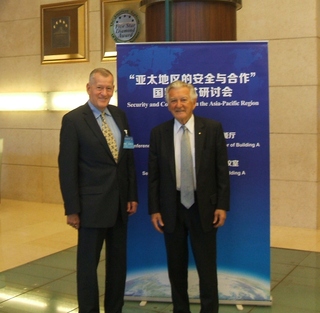

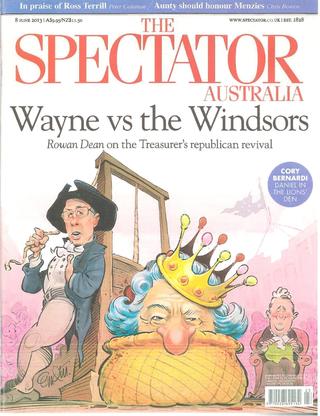
POST ON ASPI WEBSITE, CANBERRA, AUSTRALIA
Obama’s mindset
15Mar 2013
By Ross Terrill
What lies ahead for US policies affecting Australia? Paradoxically, the greatest doubt about America’s strength in the world comes from within the US itself. Obama’s second term foreign policy will probably resemble his 2008 campaign and the early part of his first term. In other words, Obama will mainly focus on domestic policy. His vision as a student, law scholar and politician in Chicago was about transforming America, not about the world. He believes the American people favour that priority. His first term frustrations in foreign policy will hardly change his view. In four years, Obama soothed international perceptions of the US in some international quarters and entered no major wars. Give him credit for that. But he transformed no world hotspots. A handicap is his worldview that sidesteps the notion of clashes of interest among nations, and encourages a multipolar world in which Washington talks with everybody about whatever, hoping that if big powers disarm, rogue states will be inspired to follow. This view is decidedly not shared by Beijing, the major world capital of most concern to many Australians and most Americans. Moreover, Sudan, Iran, North Korea and others have been slow to heed Obama’s call to rectitude. Yet he’s extremely unlikely to return to Bush’s big stick approach and pro-democracy sermons.
Obama is content to sit at the table of world politics, listen to all, and pluck harmony (he hopes) from a cacophony of voices; a light American footprint will be available but only a last resort. China, though authoritarian, seems more realistic and focused on its goals, and the difference between the two powers’ mindsets should worry Canberra. Obama wants to be universally liked, but that never happens with a US president. He seeks multilateral solutions in a world that seldom delivers them. His idealism ebbs into wishful thinking. Accordingly, one of his aide’s characterised his style as ‘leading from behind’.
Australian social democrats rightly sense a fellow feeling with Obama. In his multilateral rationality he resembles Whitlam and other Labor figures. Grand gestures are irresistible to such leaders; Whitlam freed New Guinea, recognised an unwitting North Korea, wanted to start a government newspaper and carved up the pie as if the Australian purse was limitless. Obama has said his cause is to bring the Kingdom of God on earth, lower the sea levels, and ‘spread the wealth around’. His second inaugural speech emphasised gay rights and climate change more than national security. Only the pressure of events is likely to constrain Obama to resolutely safeguard sea lanes and free trade, protect integrity of the Internet and buoy Washington’s true friends.
Ross Terrill of Harvard’s Centre for Chinese Studies is a visiting international senior fellow at ASPI. Image courtesy of Flickr user The White House.
LATEST!
JANUARY 12
During spring 2013 Ross will be Senior International Visiting Fellow at the Australian Strategic Policy Institute in Canberra, lecturing on China’s challenges for the United States and Australia in Canberra, Melbourne and Sydney
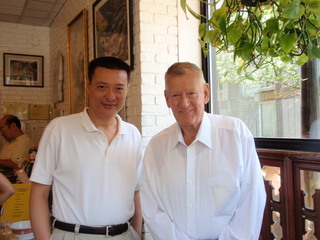
JUST OUT!
One of Ross’s most popular books, The-Australians: The Way We Live Now
is now available in Kindle for $9.99
JUNE 17
Printed in “Weekly Standard” on Monday will be my article:
"The Case of the Shaky Ally
The U.S.-Australia Cold War of 1972-73".
CAIRO, APRIL 20
I am on a short trip here: to vacation, think about why Beijing is jumpy about the “Arab Spring,” and enable Mohamed to flex his muscles within the Muslim world. I came here decades ago as a student and the only building I recognize is the magnificent Egyptian Museum.
It is indeed a Muslim world; our taxi driver this afternoon stopped as the call from the Mosque to prayers filled the air, so for twenty minutes we waited for him to return and resume the trip. Buildings of the Muslim organizations are huge and opulent.
Mohamed translates the ubiquitous graffiti on the walls and fences; many are Islamicist, some are pro-military. The famous Tahrir Square is a sad symbol of a “revolution” gone off the rails. Scruffy, dirty, surrounded on all sides with walls shouting painted slogans from a faded battle. It looks like a square or park in Boston the day after a parade or festival. New on the walls are photos and slogans of the surviving candidates for the looming presidential election. By late this year we should know whether Egypt is on the way forward or not. We look at apartments. Mohamed wants to buy one; they are cheap - $90,000 for a three bedroom - but there are too many uncertainties.
Cuisine is very good in the international hotels (though expensive) and equally good in the local spots (cheaper). The Lebanese restaurants are outstanding. Oranges hang in bags from shops in every street and the delicious juice is squeezed on the spot as you wait. Wonderful still is the stately Egyptian Museum, where I am reminded that the Pharos were in action 1000 years before Chinese civilization really got going.
Underrated factor is how much the Egyptian economy has suffered over the past 1-2 years. It is sad to see shuttered shops and hotels more than half empty.
Swimming and sunbathing on top of the Kempinski Hotel, I am happily distracted by reading Camus’ “Notebooks” and a Chinese-language book, given me by its author in Jinan last year, about how ancient China throws light on current China.
At the pool the clock on the wall disappears after being there for days. After one day’s absence it returns. But the time is wrong and next day the clock has gone again. The pool water is too hot and I ask if it could be made cooler. “Yes, we will do it.” Next day a lady complained about the cold pool and they made it warmer. The irrational steps are all done with exquisite politeness. Throughout the hotel a request is met with a winning smile and the words, “With Pleasure!”
I spent Easter Sunday early evening at a Coptic Christian church. Five hundred evidently middle-class worshippers, some of the women with covered heads, children quiet beside them, clutched a Bible in Arabic and rose to their feet then sat again dozens of times, as the messages and the singing and chanting (all without any instrumental accompaniment) went on for hours. Only the pictures on the walls of Jesus, Mary, the Apostles and others recalled a Protestant or Catholic service. The fluidity of Egypt’s modernization is glimpsed at the church: some women are with head-gear, others without; some women in a separate women’s section, a few in the men’s section with a husband or a child.
The stage of modernity in the Middle East recalls Joseph Levenson’s ideas on China and modernity. The CCP's role in China’s modernization was limited to destroying the old order and achieving political reorganization. After that, the meaning of “from Deng Xiaoping to Mao” was modernization by means of basically American tools, free markets, free trade, foreign money into China. Still under the CCP, yes, but no longer Maoism. Perhaps the Islamists here are a counter–part to the Confucian establishment in China in the late Qing? But what the Chinese revolution wrought has not fully occurred here: Islam still bestrides politics ( in varying degrees in different Middle East countries).
The Cairo atmosphere reminds me of South Korea under President Park in the 1970s or Thailand under the generals in the 1960s: the thumb of the military is never far away; society has to keep its distance. The big difference is the pervasiveness of Islam. In the current political maneuvers we see Mubarek-era military on one side and mainly youthful left-liberals on the other. But the Muslim Brotherhood, only a semi-political organization, has the immense advantage that it reaches into both wings with a claim on the loyalty of millions beyond its immediate political constituency. It can successfully dissemble; now in Tahrir Square, now flitting away to the Mosque.
Chinese friends tend to draw the same lesson from Egypt’s last 1-2 years as they do (influenced by their government’s propaganda) from the fall of the Soviet Union; better stability under authoritarianism than a leap into a messy unknown. My Beijing publisher and some of his editors, including the editor of my “Mao,” happened to travel to Egypt last year for the 43rd Cairo International Book Fair. China was the country of focus for the fair. Mubarak was to open the event. All very exciting for the editors. But It was late January and by the time the Chinese reached Cairo the city was in turmoil. The fair was canceled. The 10,000 books the Chinese had brought were abandoned.
Said my own editor after she managed to get of chaotic Cairo back to Beijing: “I’ve never been so appreciative of stability and unity” as after seeing Egypt. She stopped criticizing her own government (for a few months).
In Asia this pattern does not exist. Buddhism never played such a role in Thailand or South Korea; it remained a private virtue. It is a terrible choice many Egyptians are faced with: between the military which can only promise a restoration of Mubarekism, and the Brotherhood that could take Egypt stumbling off the modernizing path.
Obama cannot have given much thought to post-Mubarak Egypt before pulling the plug on the benign dictator. The future is really in the balance as religious past and political future wrestle with each other. But the coming election might get it back on track to fulfill the “Arab Spring.”
-
March 23
Watch for an article on China crisis in "Weekly Standard" next week.
ROSS SPEAKS NEXT MONTH AT HARVARD ON HIS RECENT TIME IN CHINA:
Friday, February 10, 2012 12:15 pm Room S030
China Lunchtime Seminar
Experiences at Shandong University: Reassessing Mao; Embracing Social Democracy
Ross Terrill, Associate in Research
Moderator: Roderick MacFarquhar, Harvard University
Professor Terrill will report on his experience this fall as visiting professor at Shandong University in Jinan. He taught a graduate student course on "United States Mental Starting Points on Mao and the CCP, from Yanan Years to Hu Jintao," and gave lectures to a variety schools, student groups, and book shops. Professor Terrill will comment on campus life in Jinan, the issues of political sensitivity, students' approach to Mao, and the interest of faculty in social democracy and its differences from "scientific socialism."
For more details, go to: http://fairbank.fas.harvard.edu/event/ross-terrill
Location: CGIS South, Doris and Ted Lee Gathering Room (S030), 1730 Cambridge Street, Harvard University
JANUARY 30, 2012
THE BBC PRIED FROM THE BRITISH GOVERNMENT INFORMATION ON THOSE WHO REFUSED ROYAL HONORS OVER RECENT DECADES. I SENT THE FOLLOWING LETTER TO THE NEW YORK TIMES:
Dear Editor,
Irony surrounds the “alternative honors list” which Sarah Lyall dissects so entertainingly (1/28). The democratic socialist philosopher R.H. Tawney, offered a peerage by Prime Minister Ramsay McDonald in 1933, wrote a two-line reply to this silver-tongued leader whom Tawney felt had abandoned socialist principles: “Thank you for your letter. What harm have I have ever done to the Labor Party?” It was then rare to turn down a peerage. Neither this nor a later refusal was ever make public by Tawney, though he did observe in an essay scoffing at royal honors: “Cruel boys tie tin cans to the tails of dogs; but even a mad dog does not tie a can to its own tail.” The egalitarian Tawney, careless of all ritual, felt socialist governments bestowing titles on behalf of the monarchy negated Labor’s claim to stand for an alternative society. “[They simply] sit up, like poodles in a drawing-room, wag their tails when patted, and lick their lips at the social sugarplums tossed them by their masters?” As I wrote in my book on Tawney, he felt “to talk about declining honors would almost be like accepting them.” Still, Tawney, late in life, believed it mattered who offered the seat in the House of Lords. When Labor prime minister Clement Attlee offered a friend of Tawney’s a peerage in 1951 and Tawney urged acceptance, a third person present at the conversation challenged Tawney’s inconsistency. “This honor was offered by an honest man,” Tawney rasped, “mine was not.”
Ross Terrill
Terrill is the author of “Socialism as Fellowship: R. H. Tawney and His Times.” (Harvard, 1973)
NEW ARTICLE IN "WEEKLY STANDARD"
Jan 16, 2012, Vol. 17, No. 17 • By ROSS TERRILL
With 28-year-old Kim Jong Eun propped up to handle Pyongyang’s succession crisis, three facts about North Korea are salient. Kim Jong Il, who died December 17, like his father was a tyrant whose damage makes Qaddafi seem a choirboy. After six decades of peaceful competition with the capitalist South, the socialist North’s per capita GDP is 5 percent of South Korea’s. Years of futile disarmament talks with North Korea compare with the worst peace-effort fiascoes of League of Nations days.
George W. Bush’s comment to Bob Woodward, “I loathe Kim Jong Il,” was a fitter summation of this cruel nonentity than the full-page world-historical pomposity of the New York Times’s obituary. Kim Jong Il made but two offerings to his people: poverty and nuclear weapons. Now, in rituals the world takes too seriously, his son Kim Jong Eun gathers titles in Pyongyang’s totalitarian edifice as a house may add gargoyles, but it means little. Half a dozen Communist regimes in Europe looked stable until suddenly gone.
“No good options exist,” the pundits always say of North Korea. “It’s the six‑party talks or another Korean War,” they declare. Give Seoul’s “sunshine policy” toward Pyongyang more time to mellow the Kim family regime. Results justified none of these hopes in 17 years’ arguing over the North’s nuclear program. There is no way to “address North Korea’s security concerns” when Pyongyang simply wants the United States to leave so it may grab the South.
Why did the Obama administration last month express hope for a “stable transition” in Pyongyang? John Bolton correctly wrote in the Wall Street Journal, “It is a self-fulfilling prophecy for Washington to see [Kim Jong Il’s] death only as a risk, rather than an opportunity.”
Fortunately, a good option does exist that would terminate the problem of nukes on the Korea peninsula. Talks would switch from Pyongyang’s “intentions” and weapons to the shape of a reunified Korea. The basis would be Pyongyang’s longstanding suggestion of a Democratic Confederal Republic of Koryo and Seoul’s similar idea of a Korean National Community.
Restoring the unity of a split country raises transforming possibilities; in this case, it can be “regime change” acceptable to nearly all parties. For 1,269 years there was one Korean state; for six decades there have been two. The reward for 28-year-old Kim Jong Eun would be respect from all Korea and a personal achievement absent in the life of his father and grandfather. Educated in Switzerland, with some knowledge of the West, he is young enough to glimpse redemption from his family’s horrible record by permitting peaceful reunification for the Korean people.
Hawks and doves have a rare opportunity to unite in this project. Reunification of Korea is a positive goal and susceptible to subtle negotiation. Hawks would see the Pyongyang regime swallowed into a new Korea government. Doves would see nukes gone from the Korea peninsula. A One Korea government, dominated by southerners, would renounce nuclear weapons. When did an American president or secretary of state last give a speech pushing the reunification of Korea? Obama should deliver one within weeks.
The Korean War (1950-53) stemmed from a struggle over reunification. The war was Kim Il Sung’s attempt to reunify Korea by force. The armistice of 1953 left unsolved this crucial issue of reunification and began the unfolding spectacle of freedom’s success and tyranny’s failure.
World War II and its aftermath were years of fluidity in international relations during which maps were redrawn almost by the week. The Soviet Union and the United States, mopping up against Japan, agreed on slicing Korea into two at the 38th parallel after a late night map examination by State Department officer Dean Rusk in August 1945. Kim Il Sung sought international Communist support for an attack on the South to end the murky maneuvers between his Democratic People’s Republic of Korea (proclaimed in September 1948) and Syngman Rhee’s Republic of Korea (proclaimed in August 1948), each government claiming to represent the whole nation.
During 1948‑49, on the ground in southern Korea, Washington signaled declining commitment to Korea’s unity and security as Rhee’s fledgling government dealt with Communist rebellions that Stalin was supporting.
Everett Drumright, who set up the U.S. mission to the Rhee government, conveyed the atmosphere of insouciance about the threat of Kim Il Sung: “In 1948 only two divisions of troops were left in Korea,” he said in an interview. “But, over our objections at the embassy, they were recalled in the middle of 1949.” The diplomat described Rhee’s reaction to Truman’s policy: “[He was] extraordinarily bitter about the . . . evacuation and what he saw as a lack of help by the U.S. at this critical juncture.” Drumright summed up sadly, “We didn’t know what was going on in Washington.”
At the end of 1949, Kim lacked Moscow’s and Beijing’s support to grab the South. But in January 1950, Washington disastrously signaled its limited strategic interest in Korea in remarks by Secretary of State Dean Acheson. In March, Stalin told Kim he would support an armed reunification if Mao could be brought on board.
Mao was cautious, but assurances from Stalin (of Soviet air support) and from Kim (that Washington would not jump in and that the South would rise up to embrace socialism) persuaded him to agree and prepare for war.
When North Korea attacked in June 1950, Truman reversed himself and sent substantial forces from Japan into Korea. Mao, already prepared for intervention, sent more than 200,000 troops when the U.S. and South Korean armies pushed back the North’s forces and reached the Chinese border.
China suffered 152,000 dead and 383,000 badly wounded in the war. Urgent home reconstruction tasks of Mao’s brand-new regime were also disrupted. A door slammed closed against Mao’s quest for the China seat in the Security Council of the United Nations. Incorporation of Taiwan into the PRC was indefinitely postponed. Beijing did not recover from the class struggle mentality developed during the “anti-imperialist” Korean War until the death of Mao in 1976.
The Korean people lost even more in the war and later from the spiritual deprivation of division and the intensifying human tragedy within failed North Korea. As a result of the role of Stalin and Mao (backing Kim) and of Washington’s failure to deter Kim, reunification was put out of reach for generations.
U.S. officials often declare the Kim dynasty inscrutable. In 2006, Nicholas Burns, then number three at the State Department, said that without a U.S. embassy in North Korea “it is hard to know what Pyongyang wants.” Not really. Kim Jong Il wanted exactly what his father sought in June 1950: a reunified Korea under Communist leadership, by military means if necessary and possible.
You would never know this from Jimmy Carter’s prattling about North Korea’s “seeking attention” and “respect” with its nuclear program. If all Pyongyang wanted was to be secure as a bug in its Stalinist rug, it would not have attacked South Korea in 1950, attempted assassinations of two South Korean presidents, and continued to attack the South—torpedoing the naval vessel Cheonan and shelling Yeonpyeong Island—even into the Obama years.
Our best tribute to the bravery of U.S., South Korean, and other soldiers 60 years ago, and our most appropriate response to the sudden political fluidity in Pyongyang, would be the reunification of Korea under democracy. It would be a smoke-and-mirrors process of negotiation that offered benefit to all parties—until the last stage.
A quiet bargain between the United States and China is the key. Beijing accepts the end of Stalinism in North Korea. Washington and its allies offer Beijing a reunified Korea free of U.S. troops and nuclear weapons. Given Pyongyang’s virulence toward Seoul last week, no chance exists for the two Korean states to take the first step. Obama and Hu Jintao must jointly urge the reunification process.
Beijing has long preferred the devil it knows (a Stalinist ally in Pyongyang) to an unknown devil (a unified Korea). But a threshold was reached in 2006 when Beijing said it was “brazen” of North Korea to perform a nuclear test; leading Korea specialists in China later declared past negotiations with Pyongyang “a failure.” Pyongyang’s defiance of Beijing, said Professor Zhang Liangui of the Central Communist Party School, is “the worst setback for Chinese foreign policy in the history of the PRC.” Yan Xuetong of Qinghua University compared the breach between North Korea and China to the Sino-Soviet split of the 1960s. “The old relationship has gone to hell,” he declared. “It’s a big slap to China.”
This was strong medicine. These specialists did not speak out without a green light from a senior figure. One must be restrained in hoping for a better Korea policy from a government headed by Hu Jintao, who has praised both the North Korean and Cuban regimes, but Beijing’s tie with Pyongyang seems atavistic for a modernizing China. An adviser to Hu Jintao at People’s University told me over dinner in Beijing in November that Hu has not really praised North Korea; he just favors “the stability” of the present situation. But younger Chinese Communists no longer want China to be known for propping up Asia’s most repressive and unsuccessful regime.
It is China, after all, not the United States, that has just two modest rivers between it and Korea; China that would feel the consequences of nuclear explosions on the Korean Peninsula. “It was a stupid policy for China to view North Korea’s nuclear weapons as potential leverage against the United States,” said Professor Zhang. “Instead the nuclear weapons will be mainly aimed at China.” Quite possibly.
Reunification would be seen as a process offering open-ended paths to One Korea. North Korea would cherish an initial hope of major input into reunification that would be dashed by the huge gap in muscle and prosperity between South and North. Seoul’s failed “sunshine policy” would suddenly come into its own as the totalitarian edifice in Pyongyang cracked and compromises, deals, defections, realignments of all kinds became possible. Reunification would end up being regime change cast in a new dress. The system entrenched in Pyongyang could never act thus, but an impulsive 28-year-old offered a role in a new One Korea government just might.
Japan would help finance post-reunification Korea—along with the U.N., World Bank, and perhaps the IMF—in return for the alleviation of a major security concern. A Korea deal could well be the key to preventing a downward spiral in Japan-China relations and the disaster of Japan making its own nuclear weapons. Japan’s worry about China is tomorrow’s issue for Beijing; North Korea’s fate should be yesterday’s.
Let a unified non-Communist Korea lean where it chooses. It is likely to be friendly to China, but not Beijing’s ally. Koreans would probably be warm to Washington and continue the present close economic and cultural relationship with U.S. society. Civil with Japan, the new Korea would also keep the door open to Russia as insurance against China.
Beijing did not want Kim Jong Eun to succeed his father, seeing another father-to-son succession as unsocialist and stifling. Now is a good time for the Chinese to roll the dice for reunification as they have zero investment in Kim Jong Eun. “One Korea” is no less of an imperative than “One China,” after all. A Chinese foreign ministry spokesman said last month: “China and North Korea have always maintained high-level visits, and we welcome North Korea’s leaders to visit China when convenient for both parties.” It is significant that he did not say “leader,” but “leaders.” Likewise, impersonal wording marked most of the Chinese statements after Kim Jong Il’s death and his son’s elevation to post after post: “The Chinese people have always stood by the Korean people.”
Some feel the democracies should just muddle along on North Korea since crumbling dictatorships are dangerous. Indeed, there is risk. The best argument against reunification is the danger of desperate acts in the North as the outcome of the process becomes clear. North Korea has a one-million-plus army whose loyalties could waver or fracture. There are probably chemical and biological weapons close to the DMZ that could fall into crazy hands. However, the international structure surrounding a step-by-step reunification process, orchestrated from the wings by Washington and Beijing, would modify the danger. Above all, a boss of North Korea in his twenties presents a huge opportunity for Obama to “transform” the Korea issue.
Overlooked by believers in everlasting “talks” is the immorality of sustaining North Korea. Condoleezza Rice once said the collapse of the Soviet Union was the biggest victory for human rights in the 20th century. How then to justify propping up North Korea? Each billion in aid—most is from China—prolongs Pyongyang’s repression and military braggadocio. The gap between South and North grows every year, making reunification more costly for Seoul. Surely the end of the Pyongyang regime would be a spectacular victory for human rights in Asia.
The writing is on the wall for the miserable Pyongyang regime, and the fence-sitting should be over for China. No longer poor and a victim, China can put deeds behind its words about “peace and development” and “international community.” Japan’s new prime minister, Yoshihiko Noda, setting off for Beijing last week, lamely declared: “It is very timely to exchange views with the host of the six-party talks and the country with the most influence on North Korea.” Not only did Noda overlook the futility of the talks but also that China’s “influence” sustains the existence of the wretched Pyongyang regime.
Four policies on Korea are possible for Beijing: Protect North Korea, with slight restraint upon it, resulting in no change. Actively promote an indefinite life for Stalinist Pyongyang (“Our East Germany,” Korea scholars in Beijing whisper; “if it falls Communist rule in China may also fall”). Gradually draw the North into Northeast China as a dependent “autonomous region,” benefiting Beijing’s strategic situation but infuriating Seoul. Finally and best, China could pull off its first diplomatic triumph as a risen power by orchestrating, with Washington, the reunification of One Korea, bringing a new vista to Northeast Asia.
The charade of treating North Korea as a troubled child requiring kid-glove handling by five patient adults has been fruitless. Steps toward Korean reunification can crack the nuclear threat from Pyongyang, lend hope to people in the North, and eventually ease a wracking pain at the heart of Northeast Asia. One Korea, for all its unknowns, is the solution. A grand bargain between Washington and Beijing can trigger the process. Japan spurred Korean nationalism through its colonial rule. Washington and Moscow were responsible for dividing Korea. These two plus Beijing bore heavy responsibility for the outbreak of the Korean War.
Korea is owed its reunification, the spiritual battle with the North for Korea’s future has been won by Seoul, and the heartbreaking cost of a third Kim dictatorship would outweigh the risk and price of a managed unification.
Ross Terrill, associate in research at Harvard’s Fairbank Center for Chinese Studies, is the author of Mao, The New Chinese Empire, and Madam Mao.
December 29, 2011
Ross was in Washington last week for a meeting at the Hudson Institute and a luncheon at the Woodrow Wilson Center, on the topic of Chinese Views of America.
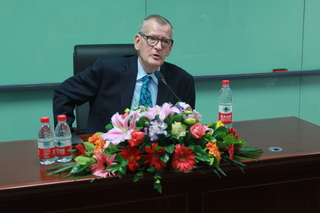
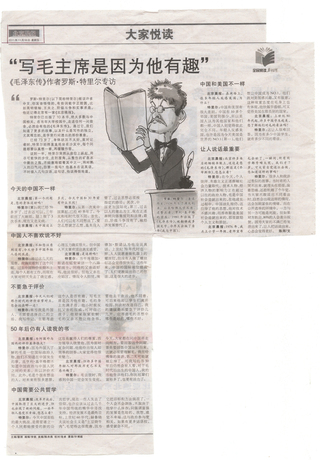
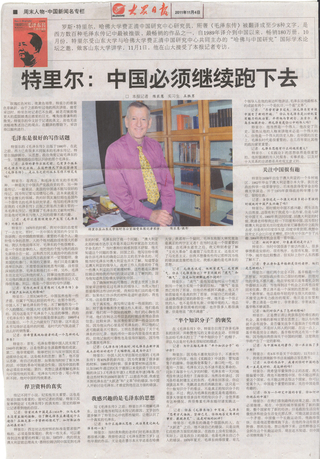
"MYSELF AND CHINA" WILL FINALLY BE IN ENGLISH SOON, AS AN E-BOOK FROM "NEW WORD CITY"!!!
September 23
Ross has done an article for the online Hong Kong Economic Journal, in its popular series
“My First Trip to China”
Here is the link:
ROSS JUST MADE A TRIP TO TAIWAN TO UPDATE ON THE SITUATION IN RELATIONS WITH. CHINA. EXPECT AN ARTICLE ABOUT IT SOON. HERE IS A PHOTO OF OUR GROUP
Delegation of U.S. Scholars to the Republic of China (Taiwan)
August 7 ¨C13 , 2011
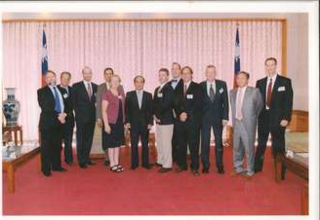
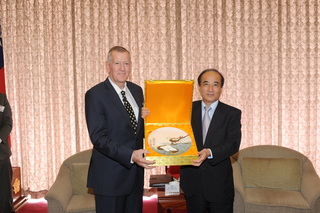
FILM ON MAO'S WIFE
A documentary, “Madam Mao,” featuring interviews with Ross as a framework for the program, is now being shown around the world. Produced in Singapore by Moving Visuals, it was shown here on the Biography Channel, with good feedback. One result is that Ross will sign a new foreign rights contract for his book Madam Mao, this one for a “Chinese complex characters” edition, indicating the version of the Chinese language written in Hong Kong, Taiwan and other Chinese communities outside the PRC. It is the seventh translation edition for the book.
The Autumn issue of "WILSON QUARTERLY" cover story is Ross's article “WHAT IF CHINA FAILS?”
Final paragraph reads:
"I HOPE FOR A MEASURED RISE OF CHINA THAT BALANCES ECONOMIC GROWTH WITH POLITICAL FREEDOM; THAT TAKES PAINS TO ACHIEVE GIVE-AND-TAKE BETWEEN CHINA'S SINGULAR CULTURE AND OTHER ASIAN AND WORLD CULTURES; THAT APPRECIATES THE 21ST CENTURY WORLD AS AN INTERLOCKED WHOLE, WITH LITTLE VIRGIN SPACE FOR A NEW HEGEMON TO PLANT THE FLAG; THAT RESTRAINS ITS MILITANT GENERALS IN THE PLA AND REJECTS HYPER NATIONALISM; THAT IS CAUTIOUS ABOUT ITS APPARENT LOOMING TRIUMPH, BECAUSE THE U.S. IS MORE RESILIENT THAN BELIEVED BY EAGER CHINESE NATIONALISTS AND THE U.S.'S OWN PESSIMISTS."
In Beijing a new edition of “Mao” appeared in 2011, the publisher having sold over 500,000 copies of the previous edition.
Ross is at work on a new history titled “Getting China Right, ” presenting the saga of eight decades from FDR to Obama of America's grappling with the Chinese Communists. Rights are still being discussed (see link to “Literary Agent”)
A Korean language edition of “Madam Mao” will be in book shops in Seoul in December, the sixth foreign edition.
Ross’s memoir, “”Myself and China” has just been published in Chinese in Beijing. It recounts stories, people, travels, and crises during 45 years in and out of China (TEXT OF PROLOGUE LINK BELOW).
